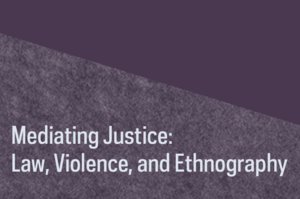Mediating Justice: Law, Violence, and Ethnography
The last year has been a transformational period for the idea of justice.

We see this, for example, in talk about the systematic inequities exposed by the high rate of COVID-19 deaths among U.S. Americans of color, as well as the mass social mobilization in response to racist police violence after George Floyd’s murder. Justice, or its absence, has become an organizing concern across U.S. public spaces and an orienting point for scholarly debate.
Inspired by these events, the Mediating Justice series asks what it is that we mean when we talk about justice. This series explores how concepts of justice emerge through mediation processes like translation, pedagogy, contestation, erasure, and appropriation. By carefully tracing how practices of justice unfold, we aim to expand our understanding of how “justice” works, including how it might work as a normative goal for justice-seeking scholarship.
The series consists of two live, virtual events:
- an opening conversation on Wednesday, February 17, 2021, at 4:00 p.m., and
- a closing keynote address by Kamari Maxine Clarke, Professor of Anthropology, University of California Los Angeles, on Wednesday, April 7, 2021, at 4:00 p.m.
Register now to attend these live events >>>
New video interviews in the series will be released each Wednesday at 4:00 p.m. Eastern (U.S.) from March 3-31, 2021. They will be published on this web page, as well as on the Kroc Institute Facebook page and YouTube channel.
Launch Event: What is the Series and Why is it Important?
Featuring: Ann Mische, Associate Professor of Sociology and Peace Studies, Kroc Institute; Julia Kowalski, Assistant Professor of Global Affairs, Keough School for Global Affairs, and Faculty Fellow, Kroc Institute; and Katherine Martineau, Assistant Professor, Department of Asian and Asian American Studies, Binghamton University.
This conversation between co-organizers Dr. Kowalski and Dr. Martineau, in dialogue with peace studies scholar and sociologist Dr. Mische, addresses the multiple meanings of “mediation” in relation to efforts to understand and pursue justice.
Episode 1: Racial Equity, the “War on Drugs,” and Changing Concepts of Justice
Featuring William Garriott, Associate Professor in the Law, Politics, and Society Program, Drake University, and David Anderson Hooker, Associate Professor of the Practice of Conflict Transformation and Peacebuilding at the Kroc Institute of Peace Studies, University of Notre Dame. They are joined by series co-hosts Dr. Julia Kowalski and Dr. Katherine Martineau.
This conversation between Dr. Garriott and Dr. Hooker addresses race, policing, and incarceration in the United States, and especially the profound impacts of the “war on drugs.” Dr. Garriott and Dr. Hooker share their different perspectives on the role of narrative in shaping local ideas of “justice,” and they talk about how racial equity can become a focus of activity in state institutions.
Episode 2: The Limits of Liberal Concepts of Justice
Featuring Julia Kowalski, Assistant Professor of Global Affairs, and Mahan Mirza, Executive Director, Ansari Institute for Global Engagement with Religion, in conversation with Katherine Martineau, Assistant Professor in the Translation Research and Instruction Program (TRIP) and Department of Asian and Asian American Studies, Binghamton University.
Reflecting on their experiences in cross-cultural spaces, including Dr. Kowalski’s research on family counseling in South Asia and Dr. Mirza’s experience facilitating the Madras Discourses project, this conversation explores longings for and dissatisfactions with liberal concepts of justice. This conversation was recorded shortly after the January 6 violent takeover of the U.S. Capitol building and addresses those events.
Episode 3: Harm, Structural Inequality, and Justice
Featuring Sameena Mulla, Associate Professor of Anthropology, Marquette University, and Alyssa Paylor, Ph.D. Student in Peace Studies and Anthropology at the Kroc Institute, University of Notre Dame, in conversation with Katherine Martineau.
This conversation brings into dialogue Dr. Mulla’s research on sexual and intimate violence in the U.S. criminal justice system and Ms. Paylor’s in-progress research on peace studies conferences involving Israelis and Palestinians. The conversation reflects on the challenges of addressing harm in contexts shaped by durable structural inequalities — when attempts to address harm often do little, or can even do more harm.
Episode 4: Mediation and Justice
Featuring Laurie Nathan, Professor of the Practice of Mediation and Director of the Mediation Program at the Kroc Institute, and Katherine Martineau, Assistant Professor in the Department of Asian and Asian American Studies at Binghamton University.
In this conversation, Dr. Nathan and Dr. Martineau reflect on the complex relationship between conflict mediation and justice, including different ways that justice can be invoked in mediations and situations in which there are significant power differentials between participants.
Episode 5: Media, Mediation, and Justice in Practice
Featuring Laura Kunreuther, Associate Professor of Anthropology at Bard College, and Justin De Leon, Visiting Assistant Professor at the Kroc Institute for International Peace Studies at the University of Notre Dame
Dr. Kunreuther and Dr. De Leon discuss how justice is put into practice via narration and re-narration--in terms of translation practices in Nepal and producing film narratives about indigeneity in North America, respectively--and reflect on how careful attention to one's own positionality as a researcher contributes to engaging justice in research.
Closing Event: Featuring M. Kamari Clarke
The final conversation in this dynamic series. Featuring a keynote address by M. Kamari Clarke, Professor of Anthropology, University of California Los Angeles, followed by a conversation with all series panelists. Catherine Bolten, Associate Professor of Anthropology and Peace Studies at the Kroc Institute, moderates the conversation.
Contact
Kate Chester
Communications Program Director
574-631-8577
cchester@nd.edu
Ari Woodworth
Events Coordinator
(574) 631-3237
awoodwor@nd.edu
Jena O'Brien
Communications and Digital Media Specialist
574-631-3991
jobrie29@nd.edu
Lisa Gallagher
Writer and Content Specialist
574-631-9370
lgallag3@nd.edu